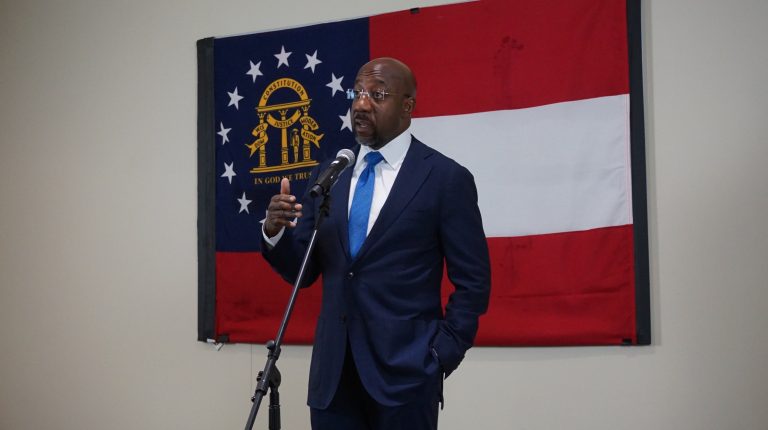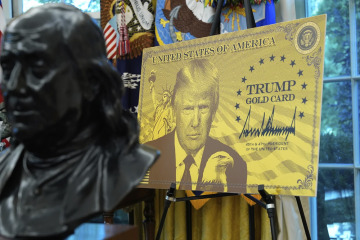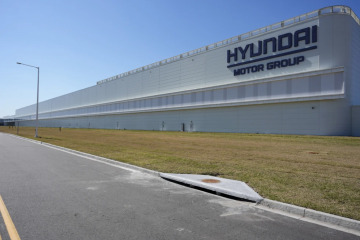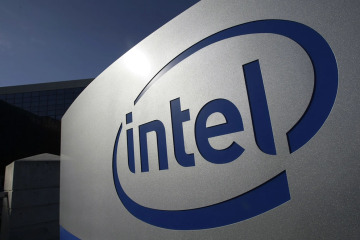By Zachary Hansen – The Atlanta Journal-Constitution
Drew Kann – The Atlanta Journal-Constitution
The South Korean automaker complained new tax credit policies could complicate the company’s plans to build a $5.5B factory in Georgia
The Atlanta Journal-Constitution is providing this content as part of our public service mission. Please support real, local journalism by subscribing today.
U.S. Sen. Raphael Warnock plans to introduce a bill Thursday to tweak requirements for electric vehicle tax credits in President Joe Biden’s signature climate and health law amid complaints from foreign automakers expanding in the U.S. that the law puts them at a competitive disadvantage.
The legislation comes as Warnock, locked in a tight reelection battle against Republican challenger Herschel Walker, has taken flak from GOP critics that the new law threatens Georgia’s biggest economic development project — a $5.54 billion EV factory near Savannah from Hyundai Motor Group that is expected to employ 8,100.
The bill from Warnock also reflects the stakes of November’s election, in which control of the Senate could hinge on his duel with Walker.
Before the climate law was signed, EVs built by Hyundai Motor brands Hyundai, Kia and Genesis qualified for tax credits of as much as $7,500, and Biden in May hailed executives of the South Korean conglomerate for choosing a site in Bryan County for the EV factory. But the law — known as the Inflation Reduction Act — requires vehicles be assembled in the U.S., Mexico or Canada and meet strict material sourcing rules to qualify, among other stipulations.
Once Biden signed the legislation, EVs like the Hyundai Ioniq 5 and Kia EV6 that are assembled overseas no longer qualify and the automakers say that puts them at a disadvantage to models built in North America.
In the long run, the Biden administration expects the tax credits will boost American manufacturing and EV sales. But in the near term, the changes could hurt brands like Hyundai and Kia, which weren’t expecting to lose the current credits before ramping up U.S. production.
How the $7,500 EV tax credits work
– Pickups, SUVs and vans must be priced less than $80,000 to qualify.
– All other vehicles must cost less than $55,000.
– The buyer can’t make more than $150,000 a year.
– Final assembly must take place in the U.S., Canada or Mexico.
– Battery minerals and other components must not be sourced from “foreign entities of concern,” which include China and Russia.
Warnock’s bill would give companies like Hyundai time to ramp up production in the U.S. before the final assembly and battery material sourcing rules kick in. If the legislation passes, it would delay the battery sourcing provision until 2025 and the final assembly requirement until 2026.
Those adjustments would allow Hyundai vehicles to qualify for the tax credits until the company’s Bryan County plant is completed in 2025.
“I want to make sure that we maximize the full potential of the bill, so I’m introducing the Affordable Electric Vehicles for America Act because I want to make sure that Georgia consumers have the full benefit of the legislation we’ve already passed,” Warnock said.
He’s set to formally introduce the bill later Thursday, but the legislation faces long odds to pass both houses of Congress before November’s elections.
Republicans, who unanimously opposed the climate change law in Congress, were quick to blame Warnock for potential fallout.
Warnock also said he’s encouraging the U.S. Treasury Department to “be flexible” with its interpretation and enforcement of the new tax credit requirements.
Only a few EVs on the market today will meet the strict new material sourcing and assembly requirements for tax credit eligibility. But that will change in the years ahead as both foreign and domestic automakers have committed tens of billions to build new North American EV plants.
Gov. Brian Kemp, a Republican who is attempting to fend off Democrat Stacey Abrams this November, has urged Washington lawmakers to alter the tax credit requirements to assist Hyundai and other automakers that are making large investments in Georgia, such as California EV startup Rivian.
Rivian plans to build a $5 billion EV factory an hour east of Atlanta that will employ about 7,500 workers. The companies were wooed with state and local incentive packages valued at more than $1.5 billion for Rivian and $1.8 billion for Hyundai.
Under the IRA, many of Rivian’s models would be too expensive to qualify for federal tax credits.
At an event Wednesday at Kia’s factory in West Point, Kemp chastised Warnock and his Democratic colleagues over the EV credit requirements.
“It’s unfortunate that they read the bill after they pass it to figure out that they’re actually helping companies that aren’t in our state and hurting companies that either are or they will be,” Kemp said. “It’s the Biden Administration that’s been picking winners and losers in Washington, D.C., and Georgia is again a loser unless they fix that with writing the rules and (regulations) to help companies like Kia and Hyundai and Rivian and others.”
Warnock said he’s proud of the climate law, especially the provision he wrote capping the cost of prescription drugs for seniors. He added that his bill is part of the legislative process and will only strengthen what’s already passed.
“Here we have a partner (Hyundai) working with the federal government to create green energy jobs and a clean energy future,” Warnock said. “We ought to incentivize them in that work while at the same time encouraging manufacturing in America, which they are doing.”
– AJC Staff writer David Wickert contributed to this article.
– This story comes from our partners at Georgia News Collaborative / The Atlanta Journal-Constitution. For more on the news and events in metro-Atlanta and Georgia, visit AJC.com









